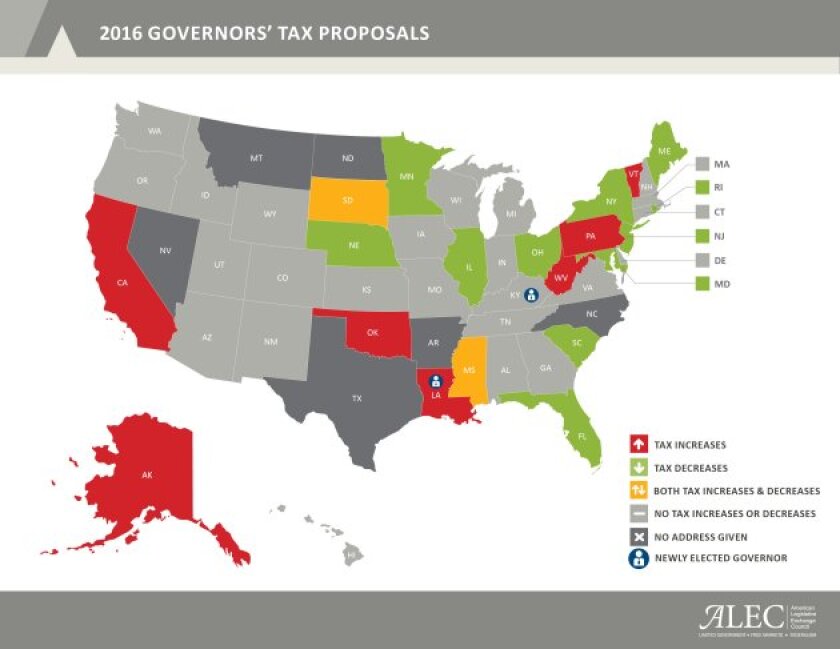Nothing is more important than what a state's chief executive actually does, of course, but much can be learned from what they say as well. In surveying the governors' most recent State of the State addresses, a clear trend emerges: Even when tax reform and spending control are blamed for economic woes they did not create, and even when the energy sector's downturn is hampering state budgets, many governors stayed true to pro-growth, limited-government principles. That is cheering news for hardworking taxpayers.
Similar to CEOs in the private sector, governors help craft the agenda and vision of their states. They do so by liaising with their state legislatures, but also through direct interaction with constituents. State of the State addresses, traditionally given at the beginning of each legislative session, represent what the executives believe that vision should be.
For the second edition of its annual State of the States report, the American Legislative Exchange Council (ALEC) Center for State Fiscal Reform reviewed each State of the State address given by an executive this legislative session. With a goal of identifying trends developing in governors' explicitly stated goals, the report tallied every tax and fiscal policy proposal. For individuals who believe governors are largely shying away from fiscally responsible, pro-taxpayer agendas, the results will come as a surprise. Limited-government and fiscally responsible proposals flourished.
Of the 44 governors who gave addresses (the remaining six states either did not have one or are not in regular legislative session this year), 19 made significant comments on tax policy, whether as broad initiatives or specific proposals. The majority of the proposals were to ease the tax burden on state economies, the most common being cutting income taxes. As even California 's Democratic governor, Jerry Brown, noted in his address, income taxes are a volatile source of state revenue. Generally, taxes on capital are not only volatile but also the most economically harmful type of levy, and reliance on them should be kept to an absolute minimum. Thankfully, governors are pivoting away from volatility; there were 13 separate proposals to cut taxes on capital, compared to only two proposals to increase them.

The report has some significant surprises, including the appearance of Connecticut's Democratic governor, Dannel Malloy, among those whose addresses it ranked as the "Best of the Best." Despite a lackluster economic track record up to this point in his administration, Malloy delivered a strong address. In fact, many of his budget-reform proposals can be found in ALEC's State Budget Reform Toolkit. And in California, Gov. Brown tacitly endorsed ALEC model policy when he reiterated the need to build up his state's rainy day fund. Even though these proposals have yet come to pass, they represent hope that good economic policy can be welcome even in the most spendthrift of states.
While facilitating the free exchange of ideas among legislators is an important part of ALEC's mission, a similar conversation among state executive branches could be just as beneficial. So long as policies encouraging limited government, free markets and bottom-up federalism exist, they should be shared among the states. If State of the States proves nothing else, it's that pro-taxpayer policies continue to thrive, even in times of economic distress.







